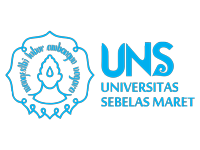Pengaruh Ekstrak Etanolik Lidah Buaya (Aloe vera) Terhadap Tingkat Maturasi Sel Sperma pada Testis Tikus Wistar (Rattus norvegicus) Model Sindrom Metabolik Terinduksi
DOI:
https://doi.org/10.20961/jhfbgj54Keywords:
Ekstrak Aloe vera, spermatogenesis, Johnson’s scoreAbstract
Pendahuluan: Sindrom metabolik memunculkan gangguan spermatogenesis, akibat adanya peningkatan ROS. Peningkatan ROS mengganggu maturasi sel sperma. Ekstrak etanolik daun lidah buaya memiliki potensi sebagai antioksidan. Tujuan penelitian ini mengetahui pengaruh ekstrak etanolik daun lidah buaya (Aloe vera) terhadap tingkat maturasi sel sperma menggunakan Johnson score.
Metode: Penelitian eksperimental laboratorik dengan pretest-posttest control group design. Dua puluh lima tikus Wistar jantan dibagi menjadi 5 kelompok, masing-masing kelompok sebanyak 5 tikus. K1-kelompok kontrol, K2-kelompok sindrom metabolik, K3, K4, dan K5 adalah kelompok tikus dengan sindrom metabolik yang diberi ekstrak etanolik daun lidah buaya dosis 200, 250, dan 300 mg/KgBB/hari. Penghitungan Johnson score menggunakan perparat histopatologi dengan pengecatan Hematoxilin Eosin (HE) setelah terminasi pada hari ke-57. Analisis data menggunakan uji one-way ANOVA, dilanjutkan dengan uji post-hoc Tukey HSD, dan uji korelasi Pearson, untuk mengetahui hubungan antara dosis ekstrak etanolik Aloe vera dengan tingkat maturasi sperma.
Hasil:. Berdasarkan hasil uji korelasi Pearson’s kenaikan Johnson score (tingkat maturasi sel sperma) sejalan dengan peningkatan dosis ekstrak etanolik daun lidah buaya dengan R2= 0,783. Hasil uji beda one-way ANOVA terdapat perbedaan antar kelompok p<0,05. Uji post-hoc Tukey HSD K1 secara signifikan berbeda dengan K2. K1 tidak berbeda dengan kelompok K3, K4 dan K5. K2 secara signifikan berbeda dengan K3,K4 dan K5. Rata-rata skor Johnson K1 9,92 0,05, K2 7,04±1,49, K3 8,93 0,76, K4 9,50 0,23, dan K5 9,56 0,53.
Kesimpulan: Pemberian ekstrak etanolik daun lidah buaya (Aloe vera) dosis 200 mg/KgBB/hari, 250 mg/KgBB/hari dan 300 mg/KgBB/hari berpengaruh positif terhadap maturasi sperma tikus Wistar model sindrom metabolik.
References
Alam, F. et al. (2019) ‘Enzymes inhibitors from natural sources with antidiabetic activity: A review’, Phytotherapy Research, 33(1), pp. 41–54. https://doi.org/10.1002/ptr.6211
Barragán-Zarate, G. S. et al. (2021) ‘Bioactive compounds from Prosthechea karwinskii decrease obesity, insulin resistance, pro-inflammatory status, and cardiovascular risk in Wistar rats with metabolic syndrome’, Journal of Ethnopharmacology, 279(June). https://doi.org/10.1016/j.jep.2021.114376
Behmanesh, M. A., Najafzadehvarzi, H. and Poormoosavi, S. M. (2018) ‘Protective effect of aloe vera extract against bisphenol a induced testicular toxicity in wistar rats’, Cell Journal, 20(2), pp. 278–283. https://doi.org/10.22074/cellj.2018.5256
Biosci, I. J. et al. (2014) ‘The effects of hydroalcoholic extract of Aloe vera gel on spermatogenesis of adult male rats’, International Journal of Biosciences (IJB), 5(7), pp. 158–165. https://doi.org/10.12692/ijb/5.7.158-165
Cramer, H. et al. (2016) ‘Yoga for metabolic syndrome: A systematic review and meta-analysis’, European Journal of Preventive Cardiology, 23(18), pp. 1982–1993. https://doi.org/10.1177/2047487316665729
Damasceno, D. C. et al. (2014) ‘Streptozotocin-induced diabetes models: Pathophysiological mechanisms and fetal outcomes’, BioMed Research International, 2014. https://doi.org/10.1155/2014/819065
Djurumana, Y., I’tishom, R. and Purwanto, B. (2020) ‘Pemberian Ekstrak Rumput Kebar (Biophytum petersianum Klotzsh) Dapat Meningkatkan Berat Testis Mencit Model Diabetes Mellitus’, 11(5), pp. 324–326.
Elekofehinti, O. O. (2015) ‘Saponins: Anti-diabetic principles from medicinal plants - A review’, Pathophysiology, 22(2), pp. 95–103. https://doi.org/10.1016/j.pathophys.2015.02.001
Ghasemi, A., Khalifi, S. and Jedi, S. (2014) ‘Streptozotocin-nicotinamide-induced rat model of type 2 diabetes (review)’, Acta Physiologica Hungarica, 101(4), pp. 408–420. https://doi.org/10.1556/APhysiol.101.2014.4.2
Gumustekin, M. et al. (2017) ‘HGF/C-MET pathway has a role in testicular damage in diabetes induced by streptozotocin’, Acta Endocrinologica, 13(1), pp. 17–22. https://doi.org/10.4183/aeb.2017.17
Herningtyas, E. H. and Ng, T. S. (2019) ‘Prevalence and distribution of metabolic syndrome and its components among provinces and ethnic groups in Indonesia’, BMC Public Health, 19(1), pp. 1–12. https://doi.org/10.1186/s1 2889-019-6711-7
Kaur, J. (2019) ‘Retraction: A comprehensive review on metabolic syndrome (Cardiology Research and Practice (2014) 2014 (943162) HTTPS://DOI.ORG/ 10.1155/2014/943162)’, Cardiology Research and Practice, 2019(5), pp. 1–1. https://doi.org/10.1155/2019/4301528
Kurnia, D. and Ratnapuri, P. H. (2019) ‘Review: Aktivitas Farmakologi Dan Perkembangan Produk Dari Lidah Buaya (Aloe vera L.)’, Jurnal Pharmascience, 6(1), p. 38. https://doi.org/10.20527/jps.v6i1.6073
Liu, H. et al. (2017) ‘Taurine Recovers Testicular Steroidogenesis and Spermatogenesis in Streptozotocin-Induced Diabetic Rats’, Advances in Experimental Medicine and Biology, 975, pp. 801–811. https://doi.org/10.1007/978-94-024-1079-2_62
Lu, X. et al. (2017) ‘Effect of diabetes mellitus on the quality and cytokine content of human semen’, Journal of Reproductive Immunology, 123(August), pp. 1–2. https://doi.org/10.1016/j.jri.2017.08.007
Martins, A. D., Majzoub, A. and Agawal, A. (2019) ‘Metabolic syndrome and male fertility’, World Journal of Men?s Health, 37(2), pp. 113–127. https://doi.org/10.5534/wjmh.180055
Modaresi, M. and Khodadadi, A. (2014) ‘The Effects of Aloe vera Extract on Reproductive Parameters in Mice’, pp. 4–6. https://doi.org/10.15242/iicbe.c814052
Moichela, F. T. et al. (2021) ‘Aqueous leaf extract of Moringa oleifera reduced intracellular ROS production, DNA fragmentation and acrosome reaction in Human spermatozoa in vitro’, Andrologia, 53(1), pp. 1–11. https://doi.org/10.1111/and.13903
Nurhidajah, Astuti, R. and Nurrahman (2019) ‘Black rice potential in HDL and LDL profile in sprague dawley rat with high cholesterol diet’, IOP Conference Series: Earth and Environmental Science, 292(1). https://doi.org/10.1088/1755-1315/292/1/012019
Pizzirusso, A. and Brasiello, A. (2022) ‘The Effect of Rice Bran on Triglyceride Levels and Histopatologic Aorta in Rat ( Rattus norvegicus ) of High Cholesterol Dietary Model The Effect of Rice Bran on Triglyceride Levels and Histopatologic Aorta in Rat ( Rattus norvegicus ) of High Cholesterol’. https://doi.org/10.1088/1757-899X/833/1/012022
Saklayen, M. G. (2018) ‘The Global Epidemic of the Metabolic Syndrome’, 9, pp. 1–8.
Sulistiawati, P. (2022) ‘Antiobesity Activity of Iles-Iles ( Amorphophallus onchophyllus ) Tuber Flour in Obesity Rat Model Aktivitas Antiobesitas Tepung Umbi Iles-Iles ( Amorphophallus onchophyllus ) Pada Model Tikus Obesitas’, pp. 348–358.
Ventimiglia, E. et al. (2016) ‘Metabolic syndrome in white European men presenting for primary couple’s infertility: investigation of the clinical and reproductive burden’, Andrology, 4(5), pp. 944–951. https://doi.org/10.1111/andr.12232
La Vignera, S. et al. (2012) ‘Diabetes mellitus and minireview sperm parameters’, Journal of Andrology, 33(2), pp. 145–153. https://doi.org/10.2164/jandrol.111.013193
Wu, J. and Yan, L. J. (2015) ‘Streptozotocin-induced type 1 diabetes in rodents as a model for studying mitochondrial mechanisms of diabetic β cell glucotoxicity’, Diabetes, Metabolic Syndrome and Obesity: Targets and Therapy, 8, pp. 181–188. https://doi.org/10.2147/DMSO.S82272
Downloads
Published
Issue
Section
License
Copyright (c) 2024 Nadzifah Nur Firdaus, Novan Adi Setiawan, Dyah Ratna Budiani, Riza Novierta Pesik

This work is licensed under a Creative Commons Attribution 4.0 International License.
Copyright @2022. This is an open-access article distributed under the terms of the Creative Commons Attribution 4.0 International License (https://creativecommons.org/licenses/by/4.0/).



